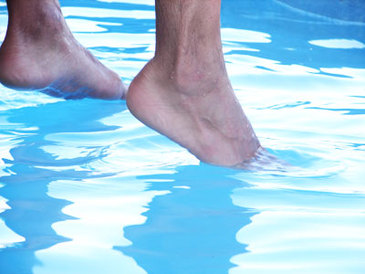 Do you remember the story about the boy who reluctantly learned only half of the alphabet and grew up to become one of the greatest and most prolific authors in history? Neither do I. That isn't how anything works, and yet it is how most of us try something we want to master or be great at. We dip our toe, maybe even both, and then complain that we haven't won the Olympic 400 meter freestyle. So we lower our expectations, equivocating, and saying, "I don't want to become a fanatic." "Instead, maybe if I dip my toe I'll at least be able to learn the backstroke." When that doesn't work, we justify the failure by saying, "I just couldn't wrap my head around getting my hair wet, so I got as far as I could without doing that." And now you don't even know how to swim. For the most part, this is what I deal with in coaching people. It has been the same whether I hired a manager, a trainer or worked with a new client. Those who dive in learn to swim right away and forever. Those who never more than dip their toe never even doggy paddle. It's the same whether someone is trying to get ripped, grow a business, become a better person, learn a new language, master an instrument, a skill, a subject, a job, build a marriage, a friendship, succeed in school or life. Commit, wholeheartedly, blindly, passionately; and do something great. Or skeptically, tacitly, dip your toe, making the most sophisticated metaphysical justifications for being average; and, one day, when you fall in, drown.
0 Comments
 Follow-up: It's a critical component of business, fitness and goodness. Though you may find the first two unremarkable, the latter may be a little unexpected. However, the very recent passing of a former client made the ubiquity of the goodness of follow-up really dawn on me. When I first entered management about a decade ago, I found that running a successful team without deleterious influences relies heavily on follow-up. You see, a lot of people pay heavy lip service to setting proper expectations. And that is true, especially as the team you manage grows. But expectations are worthless without revisiting them, evaluating performance in light of them, and the like. Likely, many people steeped in the business world know this well. Even just in sales, many a successful sales rep knows that their paycheck is contingent on how well they execute follow-up with leads, especially dried up cold leads, former buyers, ex-partners, etc. But follow-up goes beyond that. As you may have caught, by the title and intro, I see something greater in follow-up. I'm not just talking about having performance reviews with employees or calling old prospects. I don't just mean to say "keep up your network." In fact, as far as fitness is concerned, I'm not even talking about accountability and tracking. When following-up with yourself, I'm not just talking about how to keep yourself on track. I'm talking about the connected worldview. That is, follow-up itself is an affirmation of the wholly implausible belief that things can, will and/or should change. It is a faith in the possibility of humanity. When you follow-up you are exercising an impractical hopefulness that people will change, that the negative worker will become an achiever, that the depressed client will finally commit to wellness, that you can affect goodness, that giving up isn't just bleak, it's unacceptable. As such, follow-up is a tangible credit to the possible, to hope, to change. Paradoxically, the seemingly impractical becomes essentially practical. Three days ago, a good friend of mine sent me an article written by a strength coach who was bragging about how he's so glad he never was in sales, and, therefore, in his opinion, he never had to fake being interested in people or listening to their excuses and equivocations. The next day I received the news that a former client whom I had stopped trying to call about a year ago (because he was no longer responding) had ended his own life. Now, I have dozens of examples of unlikely people whom I never gave up on; and years later finally had a breakthrough. But just one example like this really sticks in my craw. Follow-up is an imperative for those of us who would create a better world. It should not be a number on a list. It has nothing to do with making a sale or being fake. It cannot be reduced to a function of keeping up your network. It is not a mechanistic method for keeping yourself accountable. It is something far greater than all of those: it's a part of being good and a genuine caring for others. It is part of a worldview that believes in making good. Do not be disheartened when people hang up on you. Do not give up hope when it seems like the path doesn't end. Do not worry about being viewed as a relentless bother. Don't allow people to bully you out of your work by charging you with ulterior motive. Follow-up with: that almost-forgotten New Year's Resolution; that former complaining customer; that unyielding debater; that despondent employee; that estranged family member; that judging critic; that long-lost friend; that "who-I-used-to-be;" that non-compliant team member; that tail-spinning stranger; that lost familiar; that straying youth; that disempowered elder. Follow-up. Follow-up. Follow-up. It is the goodness imperative. Follow-up tirelessly, happily, unendingly. Someone's very life depends on it. |
Elev8 Wellness
|
LIVE. AWESOME.We offer the highest quality in personal fitness, nutrition, and mindset coaching, helping you achieve your fitness, health, wellness and performance goals no matter the obstacle. With virtual online training and private, in-studio training we make it easier to reach your wellness goals safely.
No more can't. No more not good enough. If you compete in a sport, let your mind no longer hold you back from being the greatest. If you don't, let your mind no longer hold you back from being the best version of you that you can be. Sign-up for a Tour Covid Screen Waiver Elev8 Waiver Become an Elev8 Instructor Space Rental |
6244 lyndale ave. s., minneapolis, mn 55423
|
© 2021 Elev8 Wellness LLC. All Rights Reserved. site map | contribute | SITE BY Sproute Creative

 RSS Feed
RSS Feed
